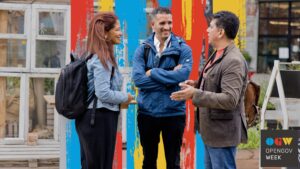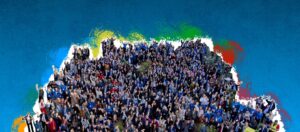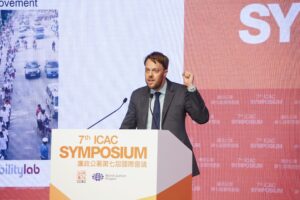Faces of Open Government: Blair Glencorse
Faces of Open Government: Blair Glencorse
Meet Blair Glencorse, Co-CEO of the Accountability Lab and Co-Chair of the Open Government PartnershipThe Open Government Partnership (OGP) is a multi-stakeholder initiative focused on improving government transparency, ensuring opportunities for citizen participation in public matters, and strengthen... More. Blair has been a key figure in global open governance and anti-corruption movements, with his work ranging from grassroots initiatives to high-level advocacy aimed at empowering communities and bridging the gap between citizens and government.
In this month’s Faces of Open Government, Blair underscores civil society’s vital role in shaping and implementing open government and how Open Gov Week provides an opportunity to further innovative strategies that can promote accountability and inspire tangible change worldwide.
As Co-Chair of the Steering CommitteeThe Steering Committee is OGP’s executive decision-making body. Its role is to develop, promote and safeguard OGP’s values, principles and interests; establish OGP’s core ideas, policies, and ru..., you’ve been at the forefront of advocating for civil society’s role in government transparencyAccording to OGP’s Articles of Governance, transparency occurs when “government-held information (including on activities and decisions) is open, comprehensive, timely, freely available to the pub... More. Can you share why you think civil society is essential in both the co-creation and implementation processes of open government initiatives?
Civil society is absolutely essential to any effective policy and decision-making progress. Without including citizens and civic voices in government, these efforts are not representative, legitimate, or sustainable. This is the case for every point across open government initiatives, from co-creation to implementation and review. This is also why OGP is so valuable—it allows for that kind of engagement. Often, government-led policy processes bring in civil society towards the end. This means that valuable feedback is too late to be meaningful or engagement with civil society organizations is tokenistic and superficial.
I support OGP because civil society’s role and voice are central to decisions around open government, from the co-creation phase onwards, which means citizens can actively shape outcomes. During implementation, they are then in a much better position to provide oversight, and support, and to understand where and when progress is possible. This builds trust and reinforces the social contract between government and citizens over time.
What motivated you to run for Co-Chair of the Open Government Partnership (OGP) Steering Committee, and what motivates you the most about working in open governance?
OGP remains, in my mind, the very best mechanism for translating commitments made at the international and national levels into progress for citizens everywhere. It is an incredible community of reformers inside and outside government; truly, some of the most impressive people I’ve had the privilege with which to work. OGP is deeply rigorous in terms of approach and reporting but is also flexible enough of a process to allow for adaptability over time around issues that evolve rapidly by their nature. Now, halfway through my Co-Chair year with the Government of Kenya, I think there are three things we are aiming to achieve:
First, renewing political leadership around OGP at every level, and using key convenings as the moments to do so, particularly the regional meeting in Nairobi in August and the UNGA Head of State event in September.
Second, to consolidate progress across the key themes we laid out at the beginning of the year and which align with the OGP Challenge; particularly digital governanceAs evolving technologies present new opportunities for governments and citizens to advance openness and accountability, OGP participating governments are working to create policies that deal with the ... More, climate, and inclusionOGP participating governments are working to create governments that truly serve all people. Commitments in this area may address persons with disabilities, women and girls, lesbian, gay, bisexual, tr... More.
And finally, supporting a smooth transition to our successors- Cielo Magno and the Government of Spain- at a critical juncture both in terms of global governance and of OGP’s evolution as a partnership.
Your work with Accountability Lab spans various projects, including music campaigns and the Integrity Icon initiative. Could you share a project that particularly resonated with you?
At Accountability Lab we work to find creative approaches to governance issues that can crowd in “unlikely” networks and build new coalitions for reform. One campaign within the Lab that has resonated with me recently is Hack Corruption. It highlights a series of regional efforts to pinpoint anti-corruption challenges with governments, then collaborates with various changemakers—such as technologists, media creators, activists, civil society leaders, and others— to build sustainable tools to solve these challenges. Exciting tools that are emerging focus on everything from preventing corruption in carbon offsets in Indonesia to digitizing land records in Pakistan. What I appreciate about Hack Corruption is that technology is not seen as the output. It is focused in a larger way on building the communities, engagement, and ideas that can provide the outcomes we need on critical accountability challenges.
How can initiatives like these demonstrate the potential for innovation and advocacy within the open government space? How can Open Gov Week serve as a platform for furthering new and creative approaches?
I find huge amounts of inspiration in the innovation I see within the open government space. Non-democratic networks that are resistant to change are constantly evolving and developing new tools and ideas to support opacity. We need to be equally as nimble to keep up and ensure they remain on the back foot. Part of what OGP does well, and what we should continue to do, is share stories around these innovations, amplify what works, and “catch people doing the right thing” as we call it. I think we also need to design for and emphasize inclusion at every possible point when it comes to these kinds of innovations. Open Gov Week is a wonderful opportunity to highlight many of these innovations and for the open government community to take the initiative to discuss where progress is being made and what more needs to be done. At Accountability Lab we’re organizing an online debate with young people (with the European Partnership for Democracy) as part of Open Gov Week. As Co-Chair, I’m working to ensure youthRecognizing that investing in youth means investing in a better future, OGP participating governments are creating meaningful opportunities for youth to participate in government processes. Technical ... More influence engagement in every facet of OGP.
Open Gov Week also presents a unique opportunity for collaboration between CSOs and governments. How can reformers leverage Open Gov Week to advance their initiatives and key areas as part of the Open Gov Challenge and what role can we all play in ensuring these efforts lead to tangible outcomes for citizens globally?
Open Gov Week is always an exciting time because there is such a lot happening and so many great ideas! I’d suggest three ways that reformers can make the most of the week.
First, I agree that linking events directly to the Open Gov Challenge makes sense- to influence the Challenge commitments that governments may be making. This will ensure relevanceAccording to the OGP Articles of Governance, OGP commitments should include a clear open government lens. Specifically, they should advance at least one of the OGP values: transparency, citizen partic... and allow the conversations to be used as advocacy moments.
Second, I’d encourage all of us to get creative. Panel conversations have their time and place but there are many other ways we can engage (online and off) that may generate learning and engagement.
Third, Open Gov Week is not a moment as much as part of a process. After the conversations next week, let’s see how we can keep the momentum going around key issues both at the national and sub-nationalRecognizing that much of what impacts people’s daily lives occurs at the local level, many OGP countries are working to open up lower levels of government by creating commitments focused on subnatio... levels and in connection to Action Plans; and informally in other fora.
No comments yet
Related Content

Open Gov Week 2024
As the world faces a host of crises, join hundreds of reformers around the world - in government and civil society - who are working to make their communities stronger,…

The Open Gov Challenge
Join hundreds of reformers around the world - in government and civil society - who are working to make their communities stronger, more open, participatory, inclusive, and accountable.

OGP Co-Chair Agenda 2023-2024: Government of Kenya and Blair Glencorse
Explore the Government of Kenya and Blair Glencorse's priorities to energize the open govermnet community.


Leave a Reply